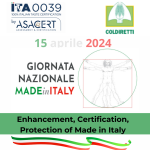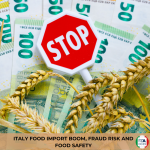Once upon a time there was healthy food, the result of cultivation in harmony with the times of Nature, with respect for the environment without too many rules, only those dictated by peasant wisdom, which was handed down in the oral traditions from generation to generation. No code, no international rule, only common sense, part of the DNA of those who lived in respect of the supreme good of the environment, as a consequence of practices written in the hands of those who knew and respected the earth, took care of it and guarded because a source of sustenance to be preserved and protected for the sake of one’s family.
More than something has been lost over the years, much of that heritage of authenticity has drowned in the sea of global consumption. One of the worst consequences of this “profit-centric” attitude is that almost one in ten people in the world get sick after consuming contaminated food.
The 73rd session of the United Nations General Assembly adopted a resolution declaring “World Food Safety Day” on June 7th, which has reached its second celebration this year. An approach in line with the Codex Alimentarius established by FAO and the World Health Organization in 1963 (Italy has been a member of it since 1966), according to which the theme to focus on from now on is: “raise public awareness to prevent, identify and manage food risks, contributing to food security, health, economic prosperity, agriculture as well as access to the market, tourism and sustainable development “.
We are what we eat and raising awareness on the impact of contaminated and deteriorated food on public health, represents a step forward towards responsible and sustainable choices. This year, more than ever in the light of pandemic events, it is a theme that invests and involves humanity, so that responsible and aware attitudes are adopted for the well-being of today, with wise and conscious practices in view of our tomorrow.
About 600 million people fall ill annually and over 420,000 die from unsafe food. The latter is the direct and indirect cause of more than 200 diseases, including some forms of cancer.
In addition to posing a serious burden on human health, unsafe food hampers development in many economies. The phenomenon of food counterfeiting is closely related to the health risks of consumers, who believe they are buying healthy and genuine food, while instead they are unaware victims of a malicious and guilty system, promoter of non-values, which feeds a market made of unhealthy and foods which, drawing attention to known colors and iconographies, spread anything but genuine.
The ITA0039 Protocol moves perfectly in line with the policy for the protection of well-being and public health 100% Italian Taste Certification. Conceived by ASACERT, ITA0039 puts in place an incessant action in defense of Made in Italy and real Italian restaurant abroad, in agreement with Coldiretti, with the support of the Ministry of Agriculture, ANRA and with the international school of cuisine, IFSE.
The issue of food safety is closely linked to the reliability of the official control system. Beyond the border, in particular, to stand out in the jungle of those who say they are the bearers of Italianness in the kitchen but in fact they are not, represents an arduous mission. Let the final customer know where to find the real Italian culture at the table is the priority that ITA0039 has given itself. The Certification Protocol is the only scientifically designed tool specifically for the protection of operators in the agri-food and food and wine sector abroad.
Refounding the agri-food system in favor of responsible, resilient and safe production and therefore consumption, capable of creating the right value for consumers, producers, society and the environment is, after all, also the objective of the strategy identified by the EU “Farm to Fork “.
The ITA0039 Protocol stems from the awareness that consumers must be the driving force behind change and to be real, they must have access to timely, clear and reliable information on the nutritional and health risks associated with their food choices. Unhealthy foods and unconscious choices generate the thickening of the global burden on public health.
Fabrizio Capaccioli, ASACERT CEO and creator of ITA0039: “The current development of the food and wine business must meet the needs of the market, without compromising environmental resources, indeed respecting and preserving them. The spread of Italian agri-culture abroad, especially through restaurant activities, together with eco-sustainability represents a further, innovative control that the ITA0039 certification puts in place. Among the verification criteria subject to inspection, particular attention is devoted, in fact, to the correct use and disposal of food packaging and recyclable materials. ” And he concludes: “There can be no effective preventive work, without a sort of food intelligence developing worldwide: the awareness that the protection of the Italian food and wine heritage, universally recognized as an example of quality and healthiness, considerably affects well-being and health of the Italian and foreign consumer in short, medium and long term. “






